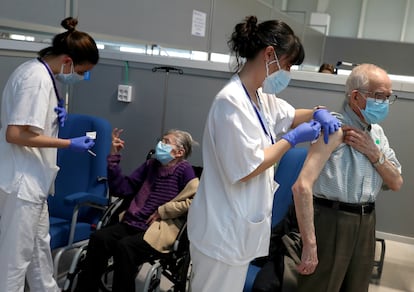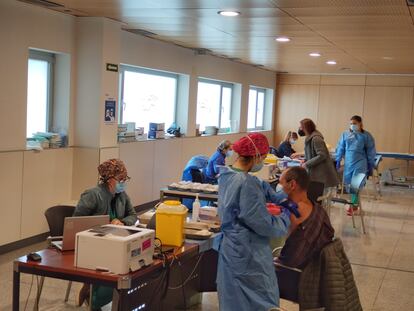Amid looming threat of fourth wave in Spain, only half of 80-and-over age group is vaccinated
With the epidemiological curve on an upward trend, many of the people most vulnerable to Covid-19 are still at risk of contracting the disease

As the threat of a fourth wave of the coronavirus looms over Spain, many of the people most vulnerable to Covid-19 continue to be at risk of contracting the disease. Only 50% of the 80-and-over age group in Spain have been vaccinated against Covid-19, according to an estimate by EL PAÍS based on figures provided by regional governments. The data indicates that around 1.2 million people who are 80 and over have been vaccinated. This figure does not include residents of care homes, a group that has been nearly completely immunized. The rate of vaccination of the 80-and-over population in Spain is slightly below the average in the European Union, where 55% of people in this age group have received their first shot.
According to EL PAÍS’ calculations, there are 2.5 million people aged 80 and over in Spain who are not living in senior homes. This number was calculated by subtracting the number of people living in senior residences from the total over-79 population, which is 2.8 million, according to the National Statistics Institute (INE). This figure was then broken down by territory and compared with the vaccination statistics provided by each regional government (the North African exclave city of Melilla did not provide data).
In Andalusia, Navarre and La Rioja, for example, more than 60% of the 80-and-over population have been vaccinated. In the North African exclave city of Ceuta, 84% of this age group have received their first shot. On the other end of the spectrum are Catalonia and the Canary Islands, where only 30% and 36.3%, respectively, have been immunized.
Only the vaccines from Pfizer-BioNTech and Moderna are being used on the 80-and-over group as the Oxford-AstraZeneca medication is limited to the under-65s. The central Health Ministry says that the vaccines are distributed equally among Spain’s 19 regions and territories on the basis of population size, but each area is progressing at a different speed.
“We have vaccinated everyone in healthcare centers as well as adults with need for daily assistance who are not in care facilities and their carers,” explains a spokesperson from the Catalan regional government. “We are also vaccinating transplant patients and at-risk collectives in hospitals with the Moderna vaccine, which is logistically very complex.” Catalonia has pushed forward the vaccination of transplant patients, a priority group that according to the national strategy should be inoculated alongside the 70-and-over population.
As has been seen in Spain’s care homes, the vaccination of the senior population – even just from the first dose – is very effective and greatly reduces the risk of mortality among this group, whose members are the most vulnerable to the disease. The slow rollout of the drive comes at a moment when the epidemiological curve is rising and the new, more contagious variant first detected in the United Kingdom is now dominant in Spain. The coronavirus incidence rate has been steadily rising since last Wednesday, prompting experts to warn of a fourth wave of the pandemic. “It is a bad situation precisely because what we are interested in is protecting the most vulnerable,” warns Toni Trilla, the head of preventive medicine at Cliníc hospital in Barcelona. “If we don’t do this, the risk of mortality will spike.”
He continues: “This is a race between the virus and us and the vaccine. If we don’t hurry up, the most vulnerable population will be at risk. The easy excuse is that we don’t have enough vaccines, but I don’t know if we could have done things differently.” There are no criteria to measure whether the vaccination drive is going slow or fast. But the fact that the percentage of people aged 80 and over who have been vaccinated in Spain is similar to the figure in other EU countries, and that most doses received have been administered, indicates that the speed depends on the number of vaccines available rather than the healthcare system’s capacity to administer them.

There is however a debate on whether Spain would have vaccinated a higher percentage of its senior population if it had followed the example of Britain and used the AstraZeneca vaccine on the over-65s. Spain, like many other EU countries, restricted the use of this medication to under-65s on the basis that there was not yet sufficient evidence of its effectiveness for the older age group.
“The European Medicines Agency did not set an age limit,” explains Trilla. “With the data available at the time, Spain made a restrictive analysis to provide all possible guarantees. Now there is more data that says that it is safe and effective for whatever age. If the AstraZeneca vaccine had been administered [on the 80-and-over age group], perhaps more of the population would be protected.”
Daniel López-Acuña, a former official of the World Health Organization (WHO), agrees: “We should concentrate our vaccination efforts on reaching 100% of the 80-and-over age group in a few weeks. We should be doing this by using the AstraZeneca vaccine and the Janssen vaccine once it is available. It does not make much sense that we are shifting the attention of the vaccination drive towards the under-55s. With spikes and the presence of the British variant, the impact on the elderly is very serious.”
With reporting by Sonia Vizoso, Juan Navarro, Pedro Gorospe Bernat Coll, Lucía Bohórquez, Ferran Bono, Eva Saiz, Guillermo Vega, Soledad Alcaide and Diego Estébanez.
English version by Melissa Kitson.
Tu suscripción se está usando en otro dispositivo
¿Quieres añadir otro usuario a tu suscripción?
Si continúas leyendo en este dispositivo, no se podrá leer en el otro.
FlechaTu suscripción se está usando en otro dispositivo y solo puedes acceder a EL PAÍS desde un dispositivo a la vez.
Si quieres compartir tu cuenta, cambia tu suscripción a la modalidad Premium, así podrás añadir otro usuario. Cada uno accederá con su propia cuenta de email, lo que os permitirá personalizar vuestra experiencia en EL PAÍS.
¿Tienes una suscripción de empresa? Accede aquí para contratar más cuentas.
En el caso de no saber quién está usando tu cuenta, te recomendamos cambiar tu contraseña aquí.
Si decides continuar compartiendo tu cuenta, este mensaje se mostrará en tu dispositivo y en el de la otra persona que está usando tu cuenta de forma indefinida, afectando a tu experiencia de lectura. Puedes consultar aquí los términos y condiciones de la suscripción digital.








































